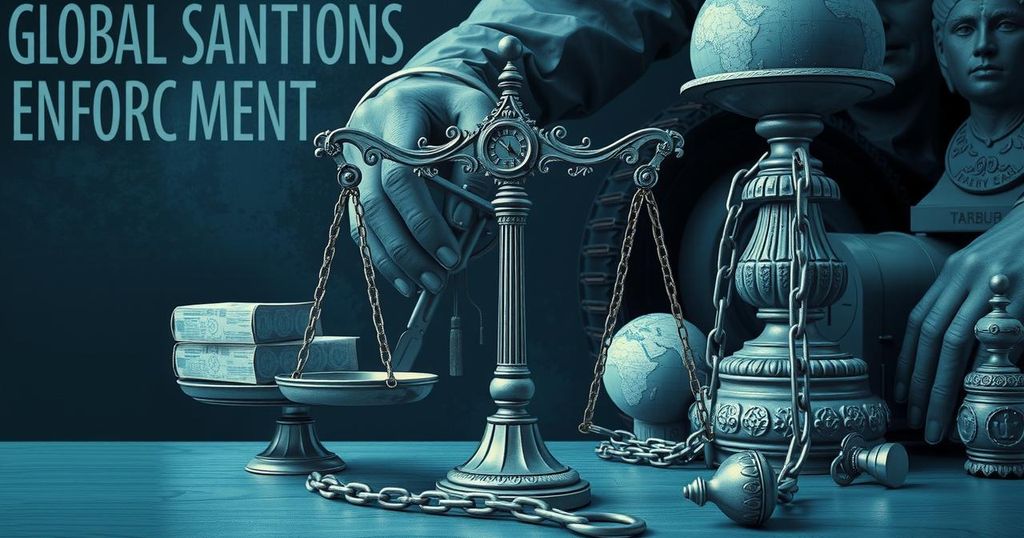Global news
“ MULTILATERAL SANCTIONS MONITORING TEAM ”, ASIA, AUSTRALIA, BEIJING, BIDEN ADMINISTRATION, CANADA, CHINA, CUBA, DC, DEFENSE, ENERGY INFRASTRUCTURE, EUROPE, EUROPE/ASIA, FRANCE, GEOPOLITICS, GERMANY, INTERNATIONAL RELATIONS, ITALY, JAPAN, KOREA, NORTH, MILITARY COOPERATION, MOSCOW, MSMT, NETHERLANDS, NEW ZEALAND, NORTH AMERICA, NORTH KOREA, OCEANIA, PYONGYANG, RUSSIA, SOUTH KOREA, UKRAINE, UN, UN SECURITY COUNCIL, UNITED KINGDOM, UNITED STATES, UNSC, WASHINGTON, WASHINGTON, DC
Fatima Khan
0 Comments
The Role and Challenges of Unilateral Sanctions Monitoring Teams Outside the UN Framework
Following Russia’s veto at the UN, eleven nations formed the Multilateral Sanctions Monitoring Team (MSMT) to investigate North Korea’s sanctions violations. This shift signifies a potential trend toward unilateral sanctions monitoring due to UN dysfunction, yet the MSMT faces challenges related to legitimacy, compliance, and the impact of sanctions on civilians. Strategic diplomatic engagements and flexible review mechanisms are crucial for enhancing the effectiveness of non-UN bodies.
Last year, Russia utilized its veto power in the UN Security Council to obstruct reports concerning North Korea’s violations of sanctions. Consequently, in October, eleven nations—including Australia, Canada, France, Germany, Italy, Japan, the Netherlands, New Zealand, South Korea, the United Kingdom, and the United States—established the “Multilateral Sanctions Monitoring Team” (MSMT) to continue scrutinizing these violations. The group’s inaugural meeting occurred in Washington, D.C., amid minimal media coverage but marked a notable shift toward unilateral strategies for sanction monitoring due to the dysfunction of the UN’s mechanisms.
Signs of division within the international sanctions framework emerged in 2018 when Russia sought a gradual reassessment of North Korean sanctions, citing their limited success in curbing nuclear ambitions. In 2019, both Moscow and Beijing argued for the partial lifting of sanctions, suggesting they worsening humanitarian conditions in North Korea. With violations arising from state initiatives, domestic authorities often refrain from penalizing those involved in such breaches.
Since 2022, Russia’s involvement in sanctions violations has escalated, particularly through weapons imports and troop deployments from North Korea related to its aggression in Ukraine. Russia’s veto of the mandate renewal for the 1718 Committee’s Panel of Experts was strategic, aligning with its current interests. The formation of the MSMT aims to address the ongoing violations the UN framework has not effectively managed and may set a precedent for future unilateral efforts.
Despite its formation, the MSMT encounters significant challenges that may hinder its effectiveness. The impact of unilateral sanctions will be limited if nations obstruct maritime oversight or utilize non-dollar financial systems. Furthermore, since violations are often state-sponsored, domestic governments are unlikely to impose penalties on associated entities. The MSMT’s lack of UN-endorsed legitimacy could render its findings disregarded by other states and provoke anti-Western sentiment, compelling Western nations to discover strategies to enhance the monitoring team’s credibility.
To navigate these challenges, the MSMT could leverage Track II diplomacy initiatives to foster trust and compliance with sanctions. Active engagement with foreign businesses and individuals to elucidate the repercussions of non-compliance is essential. Moreover, incorporating feedback from other nations regarding sanctions could enhance the overall regime. A coalition between Western and developing nations is crucial since the latter often serve as enablers for sanctioned states engaging in illicit activities.
Both UN and non-UN monitoring entities must prioritize mechanisms that allow for a more flexible review of sanctions to alleviate adverse effects on civilian populations. The current experience with sanctions in North Korea illustrates that restrictions can inadvertently undermine humanitarian efforts. Failure to regularly assess sanctions risks increasing aggressive behavior from sanctioned countries, necessitating that both MSMT and similar bodies address these multifaceted challenges for successful implementation of UNSC resolutions.
The establishment of the Multilateral Sanctions Monitoring Team represents a significant evolution in international responses to sanctions violations amid challenges within the UN framework. However, the effectiveness of such unilateral efforts may be hindered by legitimacy issues, lack of collaboration from sanctioned nations, and the potential exacerbation of anti-Western sentiments. Strategies focusing on diplomacy, stakeholder engagement, and flexible sanctions review are essential in enhancing the efficacy of non-UN monitoring bodies and ensuring that sanctions do not adversely impact innocent populations.
Original Source: www.lowyinstitute.org




Post Comment